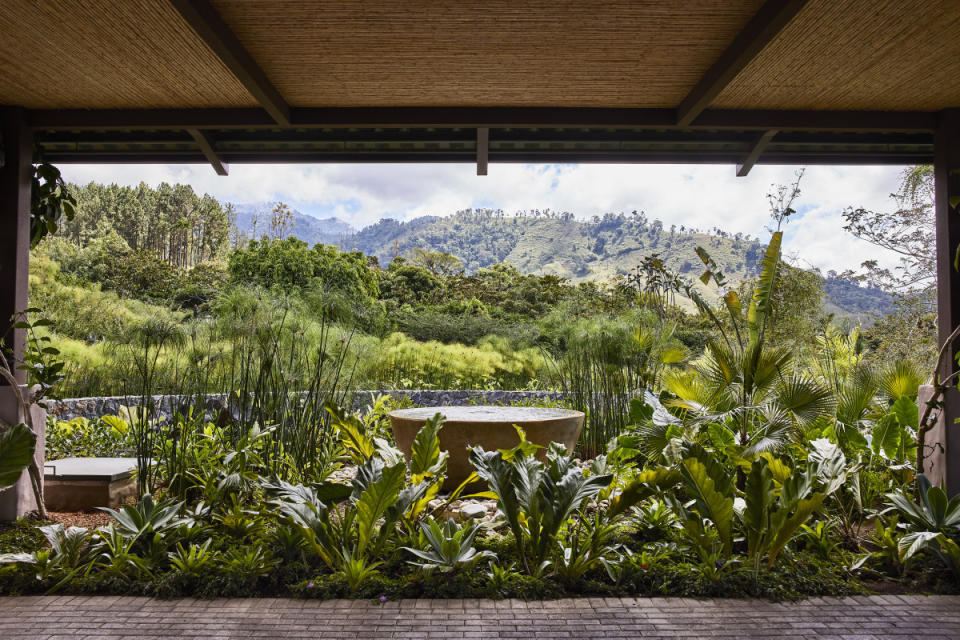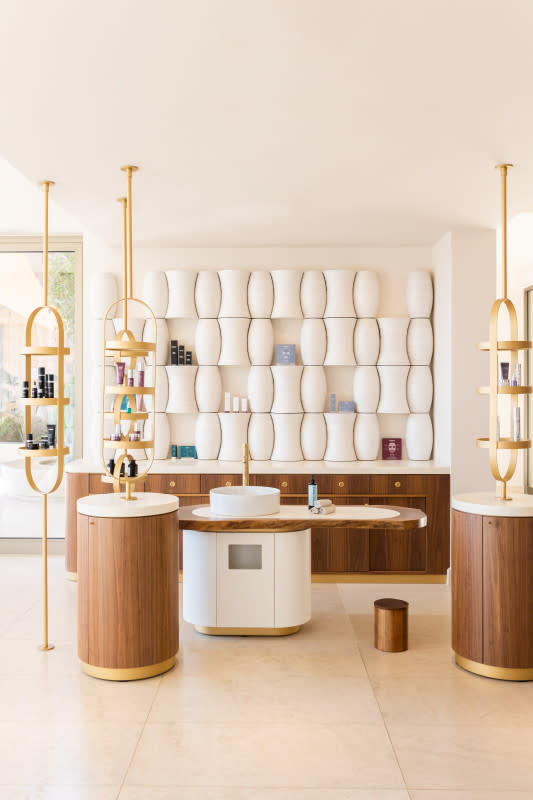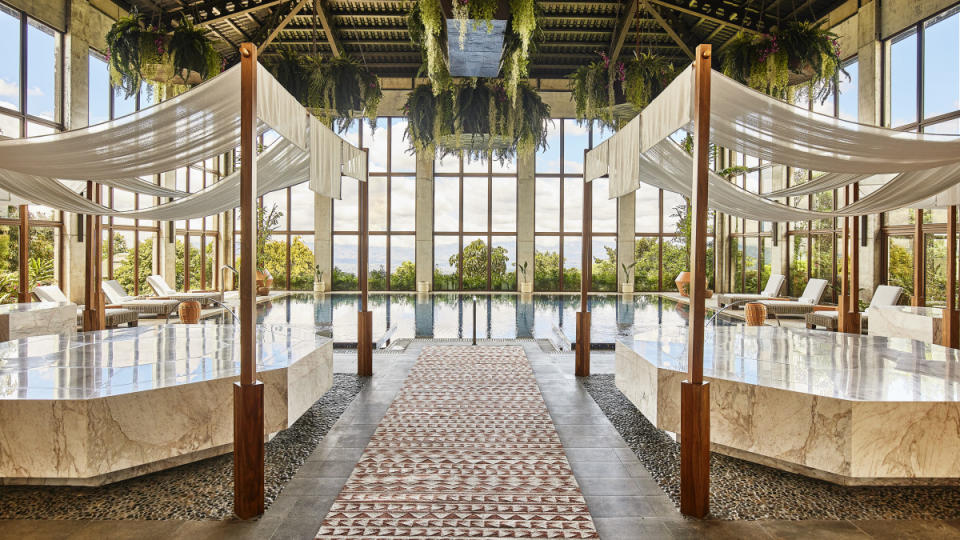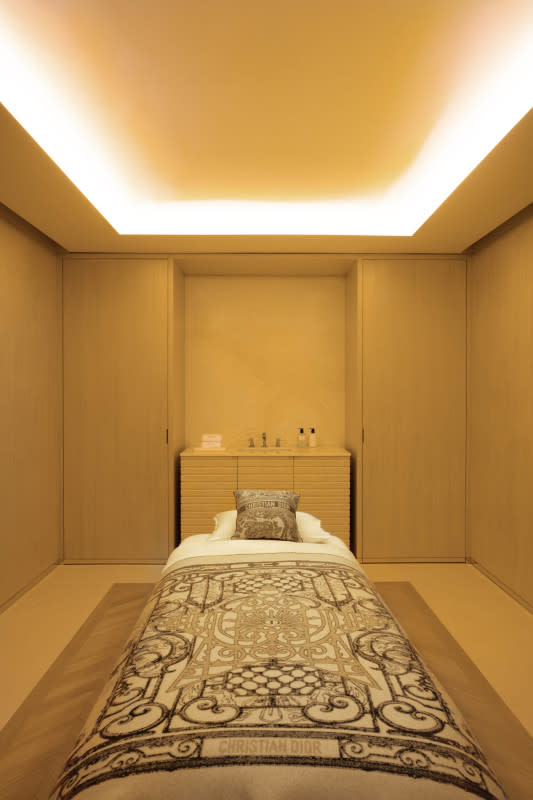Why Beauty Brands Are Taking Over Luxury Hotel Spas
Stepping into the Dior Spa at Hôtel Plaza Athénée feels like entering the brand's version of heaven. The soothing space is an oasis in the middle of Paris and the aesthetic is exactly what you'd expect: Light and airy, sophisticated yet cozy, Dior throw blankets and pillows in the Maison's signature prints covering cushy chairs, while oversized Dior tomes and accessories fill the welcome room. The products used in treatments are, of course, all Dior, too, reminding you that the birthplace of Dior at 30 Avenue Montaigne is mere steps away.
Dior has also opened spa outposts at the Lana in Dubai, Hotel du Cap-Eden-Roc in Côte d'Azur and it's currently hosting a pop-up version at the Royal Scotsman in Scotland. This sort of arrangement — in which a prestige beauty brand takes up residence in spa — is becoming increasingly common. Lately, luxury resorts and hotels have been turning to a range of big-name brands — La Mer, 111Skin, La Prairie, Guerlain, The Well and HigherDose, to name a handful — to enhance their spas and wellness programs in a variety of ways.
These partnerships range from co-branded spas to treatments spotlighting a brand's products. "The world of wellness has a natural fit within hotels," says Zeev Sharon, chief development officer at The Well, which initially opened as a standalone spa and wellness space in New York City and has since established The Well-branded spas and programs at Auberge resort properties like The Mayflower Inn in Connecticut and Hacienda AltaGracia in Costa Rica. "In the post-Covid world, everyone is looking to have more wellness in their lives."
Sharon compares the boom in wellness and beauty brands teaming up with hotels to properties partnering with stars of the culinary world to elevate their dining options: "A few years ago, hotels realized that they're amazing at creating beautiful hotels and resorts," he says. "But sometimes they're not amazing at food and beverage. We saw all kinds of hotels bringing celebrity chefs and top-notch restaurant operators to take over the F&B. That's what we're seeing now with wellness. Hotels are realizing there's a certain specialization to wellness that is not at the core competency of most hotel companies, so there's a lot of value in bringing someone laser-focused on wellness." (We're also now seeing similar link-ups in retail.)

Photo: Courtesy of The Well
Where in-suite amenities were once the single most direct way to get product into luxury travelers' routines, branded spa and wellness programs take things a step further, and present even more business opportunity for both the resorts and the brands.
"A niche skin-care brand of our size, we have our own clinic and treatment space in London; however, we don't have the capacity to completely take over a spa," says Eva Alexandrides, co-founder and CEO of 111 Skin. "As much as we want to have standalone properties around the world, financially, this is prohibitive." Instead, 111Skin is typically the leading brand in many spas across the globe.
HigherDose found that partnering with spas and hotels was an easier way to scale its business, which centers on infrared technologies. "In 2020, especially as we shut down our locations, we started to ramp up more of our partnerships," says Katie Kaps, co-founder and co-CEO of HigherDose. The brand's infrared sauna and LED products can now be found at the Equinox Hotel and Casa Cipriani New York, among other destinations.
Some of these partnerships have also changed how hotels offer their wellness experiences. About a decade ago, yoga mats and weights became a popular amenity for guests to order to their hotel rooms so they wouldn't have to leave the comfort of their suites to work out. HigherDose has a similar model. "It's like room service, where you order a HigherDose experience to your room," says Lauren Berlingeri, co-founder and co-CEO of HigherDose. "You don't want to plan your whole day around your workout or massage when you're traveling, so it gets delivered to your room and they pick it up at the end of the day."
Berlingeri adds that it's an easy option for hotels that don't have a spa but want to get in on the wellness boom. "All hotels need to be thinking about what their wellness offering is, and if you don't have a spa or gym, this is so easy. There's no build out; it's so plug and play." Currently, 1 Hotel, Surf Lodge MTK, Baccarat Hotel and Nobu all feature HigherDose's in-room wellness offerings.
To emphasize the shared partnerships, beauty and wellness brands will shape their treatment menus according to the environment. For The Well, Sharon estimates that 60 to 70% of their offerings are consistent across the world, but 30 to 40% of the menu will be specific to each destination.
"In the world of hospitality, things can start feeling the same when everything is all about cookie-cutter brand standards," Sharon says. "When someone has a treatment at The Well at Chileno Bay in Cabo, our latest Auberge location, you want to make sure that you have an authentic Mexican experience. We created treatments there that are very specific to that location." The region is known for its artisanal scarves, and The Well incorporated them into stretching as part of the massage therapy. At Auberge Hacienda AltaGracia in Costa Rica, which is surrounded by the rainforest, The Well's team created a manmade riverbed in a natural river that's a small pool heated by wood burning fire, where people can have massages. "It's very important to create a sense of place," he adds.
Typically, the menu is a joint offering between the spa and the brand, and it's curated to the demographic at each hotel or location. "It's a very considerate conversation with the spa," Alexandrides says of 111 Skin's partnerships. "If it's a property predominantly in the sun, then we take this into consideration, and we want to make sure that its facials fit this particular audience. If it's a city property, then we might look at different modules where we have add-ons for people with a very busy lifestyle. We are considering everything. Mainly, we're interested in who is the client and how we can service them the best, and it's a two-way conversation."

Photo: Courtesy of 111Skin
But one thing 111Skin doesn't do is mix products from other brands into its treatments; the brand's products have only been tested to work with each other. "They're tested to work in our protocols," Alexandrides says. "We don't use parabens or silicones, so we don't want to mix with other products that potentially might have this, because we want to make sure that the result is very precise to what we're trying to achieve." This, too, is another opportunity for the brand to market — without noise or clutter from competitors — to clients.
The brand's training process for practitioners is typically quite intense to ensure treatments are in line with brand protocols. "As much as we want to partner with every spa that comes our way, we have requests every single day, and we want to make sure that we can partner with spas that have the same high standards as we have in our clinic," Alexandrides notes. "Therapists are very well educated and trained so they understand protocols for high-end, results-driven skin care."
The hospitality and beauty worlds are small, so many partnerships come about through word of mouth — but they're always carefully considered. "First and foremost, there needs to be an alignment of vision, mission and values," Sharon says. "It's almost like a marriage. You want to find a partner [with] similar ambitions; you want to serve your guests at the same quality level. If we dig further from that, we always want to be in the best, most iconic destinations in the world, whether they are in an urban setting or a resort in up-and-coming destinations. And we want to make sure we have the best partners."

Photo: Courtesy of The Well
The structure of these business partnerships can vary widely, spanning from true partnerships to licensing to product deals. In The Well's case, it's essentially a hybrid between licensing and managing a location. "We are very hands-on the whole period leading up to the opening, and we have a critical role in selecting the design team that would redesign or build the space," says Sharon. "We are critical at determining what the program would be, what the guest experience would be, the look and feel. What do you touch? What do you smell? What do you see when you enter the space? What will all the standard operating procedures be?"
The Well's team also has a hand in leading and curating retail. "We have strict guidelines of what kinds of products we would sell versus not; we're very focused on sustainability and clean materials," explains Sharon. "It's an intensive effort until we open and then we continue that on an ongoing basis." The Well keeps heavy guidance and oversight, and schedules weekly calls and periodic site visits. In many cases, the company also sources the general managers for those clubs.
Bringing in an outside wellness or beauty partner enables the spa or property to expand its offerings in ways that wouldn't be possible without the assist. "We don't just bring our product protocols, we also introduce technology," notes Alexandrides. "We were the first brand to bring cryotechnology into the treatment menu of spas."
Berlingeri adds that many hotel spas don't have infrared saunas and HigherDose is a simple way to introduce that. "If you can put them into an infrared sauna blanket for 45 minutes, it's much easier [than building a sauna]," she says. "Or if you're already lying down and getting a facial, you can add on a red light face mask. Now spas are looking to elevate their offerings by adding these types of experiences that are more rooted in science and can back up the benefits. With our wellness technologies, they can claim things like detoxification or downing cortisol and these real-life benefits that are more quantifiable."

Photo: Courtesy of Dior
Ultimately, synergistic partnerships like these can be win-wins because they increases the brand's awareness and reach while (ideally) increasing profits for the spa or hotel. "Until recently, it was common knowledge that hotels lost money on spas, but it was a must-have because their customers wanted it," Sharon says. "But for us, our clubs are very profitable because there's a laser focus on them and they're programmed in a different way. Hotels are discovering that if they bring these kinds of businesses... they can actually profit in that department. By creating that experience that is not just service-driven, but also incredible facilities, it changes the whole dynamic of how that business works."
Want the latest fashion industry news first? Sign up for our daily newsletter.

